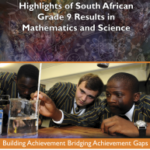TIMSS 2019 Highlights of South African Grade 9 Results in Mathematics and Science
Achievement and Achievement Gaps

About TIMSS TIMSS is an assessment of the mathematics and science knowledge of fourth and eighth Grade learners around the world. A few countries, including South Africa, assess fifth and ninth Grade learners. The International Association for the Evaluation of Educational Achievement (using IEA constructed scales designed for the group of international participants, which provides South Africa with aspirational targets) designed the TIMSS assessment to allow participating nations to measure and monitor the health of their education systems, to measure achievement trends over time, and to compare their learners’ educational achievement across borders (website https://www.iea.nl/studies). The TIMSS assessments align broadly with the mathematics and science curricula of participating countries. Demographic and contextual information collected from learners, teachers, parents and schools provides a rich dataset to explain the observed achievement. Taken together, TIMSS provides comparative data about countries learner achievement and the home, school and classroom context in which they live and learn. TIMSS in South Africa Since 1995, the Human Sciences Research Council (HSRC) has conducted TIMSS in South Africa. The country participated at the Grade 8 level in the 1995, 1999 and 2003 cycles and at the Grade 9 level in the 2003, 2011, 2015 and 2019 cycles. TIMSS 2003 included both Grade 8 and 9 learners and provides an achievement trend measure from 1995 to 2019. For a better insight of education and achievement in primary schools, South Africa conducted the TIMSS 2015 Numeracy assessment at the fifth Grade. TIMSS 2019 includes both the mathematics and the science assessment. Following the TIMSS 2015 Grade 9 results, two of the higher achieving provinces, the Western Cape and Gauteng, sought a more precise provincial achievement estimate. The sample size in these two provinces, for TIMSS 2019, increased to 150 schools, while sample size in the other provinces remained at 30 schools each. The TIMSS 2019 International Results in Mathematics and Science Report, in addition to reporting information for South Africa, also reports on Western Cape and Gauteng provinces as selfstanding entities called “benchmarking participants.”
